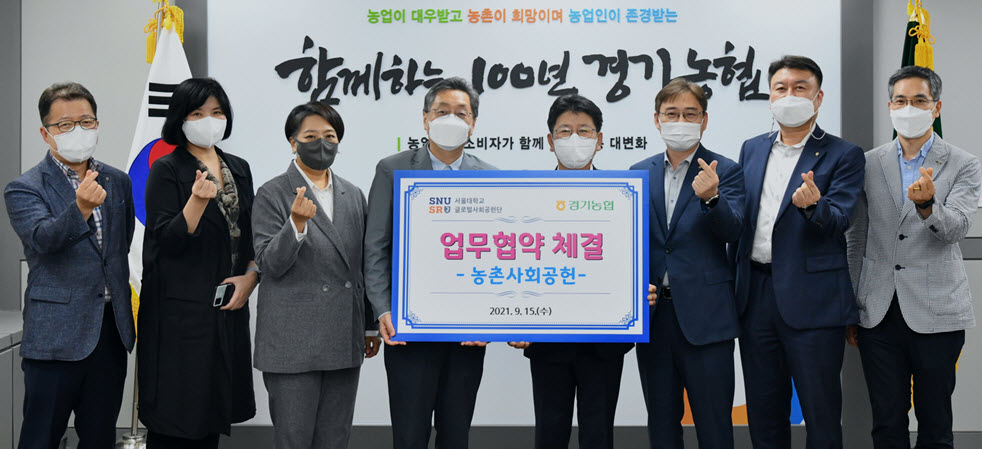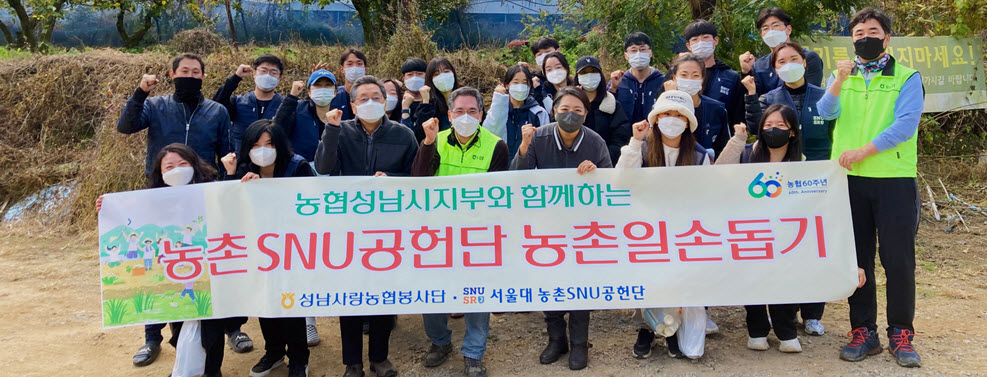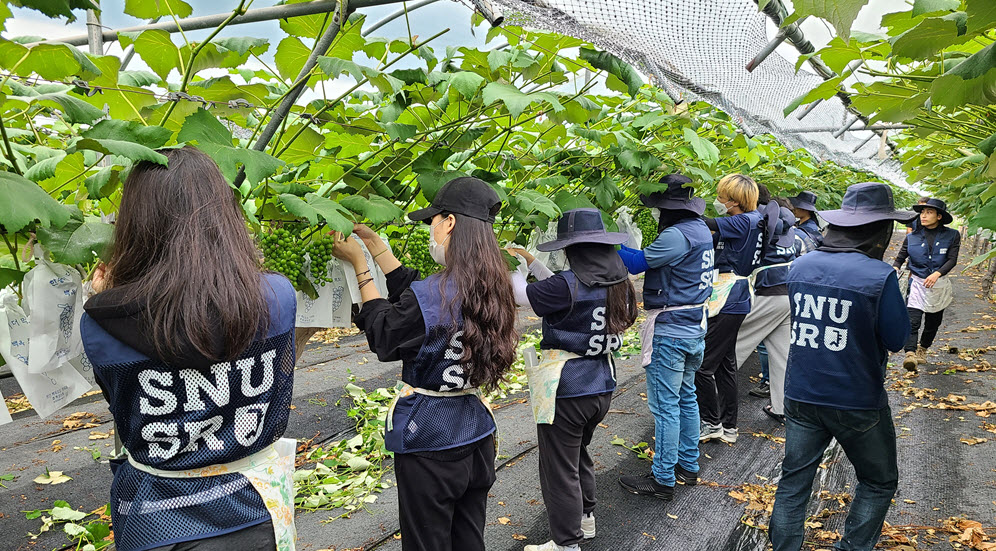While slowly regaining everyday life in the era of ‘living with COVID-19’, some are experiencing prolonged problems. In particular, farmers are having difficulty in finding workers due to the decrease in population in rural areas and prolonged COVID-19. As crops need to be taken care of at the right time, lack of workers is a major obstacle for farmers in harvesting good-quality crops. Seoul National University Social Responsibility (SNUSR) has been running the ‘Agriculture SNUSR Corps’ since September last year to resolve the shortage of workers.

SNUSR signed an agreement with the Gyeonggi Regional Headquarters of NongHyup in 2021 to resolve the shortage of workers in rural areas.
A wide range of school members, including undergraduate and graduate student and faculty participated
The "Shanong Shanong" program of the ‘Agriculture SNUSR Corps’ has been organized by SNUSR and the Gyeonggi Regional Headquarters of the National Agricultural Cooperative Federation (NongHyup) since the second half of last year to help farmers during hard times when inflation and the restriction of foreign workers from entering and leaving are exacerbating the difficulty of running a farm. Agriculture SNUSR Corps was launched in September by a business agreement between with SNUSR and NongHyup. SNUSR recruited participants from Seoul National University, including undergraduates, graduate students and faculty, while NongHyup was in charge of selecting sites, signing up for insurance, and certifying volunteer hours. The activity was held six times in the second half of 2021 in rural Seongnam-si, Gyeonggi-do, and participants helped harvest sweet potatoes, manage vegetable gardens, clean mushroom medium, and prepare for the wintering of vinyl greenhouses.
In the first half of this year, the "Shanong Shanong" program was held once a week from April 21st (Thursday) to June 15th (Wednesday). Activity areas have also increased significantly including Ansan, Anseong, Uiwang, Yongin, Suwon, Gunpo, and Hwaseong. This year's first activities began with 11 undergraduate, graduate, and professors and 7 international students from Seoul National University visiting the Geumgwang Agricultural Cooperative Federation’s bionursery in Anseong. Participants installed a seedling plate on a rice field of about 300,000 square meters. From the second half of last year to the first half of this year, 10 to 15 applicants participated in Shanong Shanong each time, and a total of 180 members of Seoul National University participated in volunteer work.

The working site of Agriculture SNUSR Corps
Giving a hand at a grape farm in Yongin
On Wednesday, June 15, ahead of the summer solstice, as a student reporter, I directly participated in the Shanong Shanong program to feel the vitality of the farm. I arrived at a grape farm located in Gachang-ri, Baekam-myeon, Yongin-si at 9 a.m. amidst the clouds which were ready to sprinkle rain at any time. Under the vinyl greenhouse, young grapevines were radiating with green vitality. Soon after, NongHyup employees and farmers, who had arrived in advance, welcomed the volunteers. The farmer said that the help of each person is a great help to running the farm at a time when labor costs rise due to COVID-19.
The main task was to wrap the surface of the grapes in preparation for the summer. Insects such as spiders are likely to hurt fruit trees when the weather gets hot. Each person was assigned 300 paper bags and began to work. While carefully wrapping the wrappers so that the grapes do not get hurt, we spent time encouraging each other. Raindrops began to thicken, but the greenhouse blocked the rain, so I was able to continue my activities without any trouble. Baekam Sundae arrived at the farm at 11 a.m. when all the paper bags I had were exhausted. The food felt more delicious and more powerful, perhaps because I was moved by the farmer's kindness to eat as much as I wanted, saying, “When it comes to Baekam, you must eat sundae and Makgeolli”. In the second round of work, which lasted until 12:30 p.m., the hands became faster and we spoke to each other and finished the work joyfully.
On the other hand, farmers, who work longer than the three hours of long labor experienced by the volunteer workers every day, always worry about whether they should give up harvesting due to the difficult situation in rural areas. In fact, one participant said, "I was sad to see that the benefits returned to farmers were low and that the pain was aggravated by a lack of workers," adding, "I am happy that our activities were of practical help and a relief to farmers during the busy farming season."

The volunteer workers are concentrating in wrapping grapes with paper bags
Sang-hyun Baek, a manager of the Seoul National University Social Responsibility, who was in charge of the Shanong Shanong program in the first half of 2022, said, "The warm heart of Seoul National University members to help neighbors suffering from COVID-19 seems to have been well delivered to rural neighbors." He added that “We are going to run the program when the farms need the most hands in the future as well.” If you are a member of Seoul National University interested in understanding our neighbors outside the school, community problems outside of large cities, and special volunteer activities, I recommend participating in the Shanong Shanong program of the Agriculture SNUSR Corps in the second half of this year.
SNU Student Reporter
Kim Daehwan (Department of Agricultural Economics and Rural Development)
daehwan4757@snu.ac.kr
Translated by
Jungyun Oh (Department of Aesthetics)

